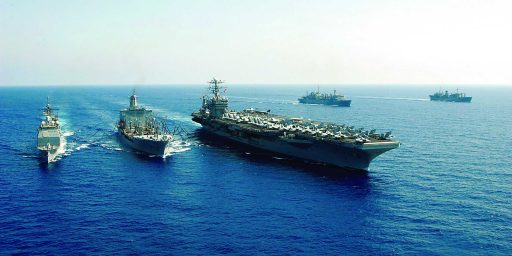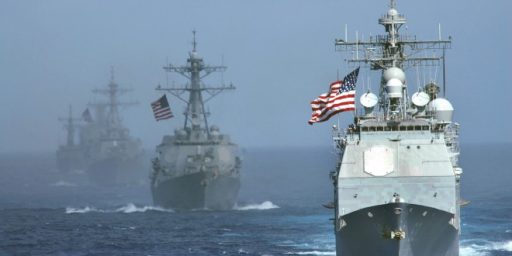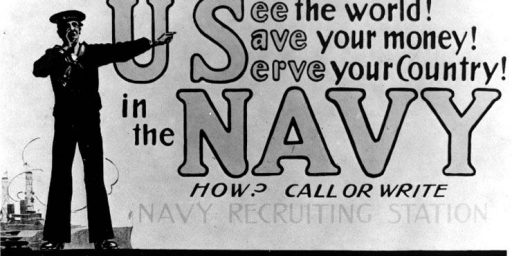Foreign Policy Debate Substantive Analysis: Defense Planning
One of the few areas of disagreement was how big our military should be.
Sandwiched between a far too-long discussion of Middle East policy, including an absurd over-emphasis on Israel, followed by a diversion into economic issues that weren’t supposed to be debated at all, the debate finally turned to military planning.
Schieffer asked, “Governor, you say you want a bigger military. You want a bigger Navy. You don’t want to cut defense spending. What I want to ask you — we were talking about financial problems in this country. Where are you going to get the money?”
Romney talked about cutting Obamacare, Medicare, and the like before Obama jumped in, arguing “The math simply doesn’t work.” Then, he declared, “But when it comes to our military, what we have to think about is not, you know just budgets, we’ve got to think about capabilities. We need to be thinking about cyber security. We need to be talking about space. That’s exactly what our budget does, but it’s driven by strategy. It’s not driven by politics. It’s not driven by members of Congress, and what they would like to see. It’s driven by, what are we going to need to keep the American people safe?”
Actually, budgets are very much driven by Congress–whose constitutional role is, after all, to craft and pass budgets. But, yes, it would be ideal to base the budget based on an honest threat assessment rather than politics. But there’s always the security dilemma: not only is it impossible to know how much security you really need ahead of time, but the mere act of arming against certain risks often increases said risks.
Romney jumps in to talk about how he balanced budgets as governor and Olympic chairman. But that’s apples and oranges; those jobs don’t allow budgets not to be balanced whereas it’s inconceivable that he or anyone else would balance the US federal budget over the next four years.
Next, he shifts to what’s likely been the most talked-about portion of the debate.
“Our Navy is old — excuse me, our Navy is smaller now than at any time since 1917. The Navy said they needed 313 ships to carry out their mission. We’re now at under 285. We’re headed down to the low 200s if we go through a sequestration. That’s unacceptable to me. I want to make sure that we have the ships that are required by our Navy. Our Air Force is older and smaller than at any time since it was founded in 1947.”
Obama retorted that, “Well, Governor, we also have fewer horses and bayonets, because the nature of our military’s changed. We have these things called aircraft carriers, where planes land on them. We have these ships that go underwater, nuclear submarines. And so the question is not a game of Battleship, where we’re counting slips. It’s what are our capabilities.”
Obama’s line was clever, if factually incorrect and misleading. It’s absolutely true that the sheer number of ships isn’t the only thing that matters; but it does in fact matter. Will a fleet in “the low 200s” be adequate to our future security needs? Well, it depends on what we ask of it. If we’re going to continue to expect our Navy to cover the entire globe simultaneously, maintain a presence in key hot spots, perform humanitarian and counterpiracy missions, and also pivot to Asia—a naval theater—then it may well not be.
Further, while Romney left himself open to ridicule with the “ our Navy is smaller now than at any time since 1917” irrelevancy, his very next line was that “The Navy said they needed 313 ships to carry out their mission.” We have far fewer ships than that now and Obama proposes to cut them.
What’s interesting here is how little time was spent on this relative to so many less important issues. And Obama never responded on the issue of the Air Force—much less introduced a discussion of the appropriate size of the Army and Marine Corps or the future combat role of the United States military.
There was no discussion of the military planning implications of the pivot to Asia—or of the merits of the pivot.
Even on what they did talk about, Romney really didn’t provide any useful insights on how he would pay for what would be a much larger force that he’s proposing. On that, Obama is right: the math simply doesn’t add up. The military is just too expensive to pay for with what amounts to change under the seat cushions.







Uh… where is the substantive analysis? I see the summary of what they said but no analysis of what it means.
Of course there’s a huge difference between the two men. Yes, Obama did not lay out plans for how many ship the Navy would have or how many new planes he’d order for the Air Force. But they both laid out the metric by which they’d make their plans — Obama said they would consider what challenges they believe they would face, and draw up budgets to address them. Romney just wanted to pour money into the military. You may choose which you find find a wiser strategy, it seems to me that one is answering like an adult and the other like a child.
If our goal is to be a global empire, than we probably need to go with Romney’s military budget.
If we want to conduct our global affairs in a sane and affordable way, then Obama’s proposals are the ceiling of how much money we should be spending.
Land wars in Asia should not be our model.
Romney’s used the line about the Air Force being older than it was in 1947. Isn’t everything? However, as clumsily as he phrased it, I expect he meant the airplanes are older. This is true. I xpect we also have fewer planes than we had in ’47. But these things are no more relevant than Romney’s ship count. The drivers aren’t Obama’s attitude, the drivers are the much longer design life, the ability in many cases to upgrade engines and electronics, and the cost. At 400 million a pop, the F22 had damn well better do the job 50 P-51s did in 1947, and last a whole lot longer. And did I mention the cost?
And the airplanes are hugely more capable. In WWII we had to send 500 B-17 to have a reasonable chance of destroying a specific target. Now it’s one airplane with four bombs and four targets. And did I mention the cost of modern airplanes?
We must not have a collier gap.
Again from Romney it’s the kind of statement that no one who knows anything could have said with a straight face. It is astoundingly stupid and dishonest.
@SKI: Indeed. I’d like to talk about the inanity of this part:
That “very next line” is exactly what leaves him open to ridicule, and also what needs analysis. What exactly _is_ the Navy’s mission today that’s so different from 1917? I frankly doubt either candidate could really discuss that (which is probably why neither of them harped on it) although Obama at least leaned towards it when he mentioned aircraft carriers – a single modern CVBG, so long as it had fuel & ammo, could demolish any 1917 navy in direct combat. Probably _all_ 1917 navies together, for that matter. So yes, as Obama implied, quality is a bigger factor than quantity here. But without a clear description of what a prospective President wants as a Naval Policy there’s really nothing to be gained by even bringing the topic up in a debate, IMHO.
Which part of that was factually incorrect or misleading?
Obama said it was about capabilities, but you turned around and said “well the number does matter!” but then you sort of make an argument about capabilities (where we want to project force, etc etc)
Obama conceded that we have less ships than before. So where was he “factually inaccurate”??
We’ve slowed down the pace of building the Ford class carriers because they’re damned expensive to build. We’ve axed Zumwalt class destroyers because they can’t provide air or theater ballistic missile defense at all. (Aegis can at least provide defense against aircraft and ASMs. I’m less confident that it could really deal with the ASBM threat effectively.) The flyaway cost for an F-35 is now higher than that of an F-22 and the flyaway cost of an F-35C is more that three times the cost of a Super Hornet.
The Navy’s response to the Asian pivot is to complain that they don’t have enough hardware to deal with the missile threat that’s growing as they become cheaper and more capable. The threat from subs, especially AIP subs, is largely ignored.
The way to contain a threat to any fleet has always been to aggregate the risk as much as possible. Currently, we’re spreading out our risk over eleven hulls. As long as the fleet is built around a few very large, very expensive and increasingly vulnerable ships there’s no way to effectively contain both cost and risk.
Even giving Romney a pass and not penalizing him for the usual situation where the challenger knows less than the President, the statements he makes indicate bad judgement, not lack of knowledge. His decisions aren’t likely going to suddenly improve after he’s elected.
Take his goal of spending 4% of GDP on defense. That’s a horribly bad idea given that our current level of defense spending. He’s basically asking Congress and the DOD to find new ways to spend money, which is pretty much the opposite of what we should be doing, asking them to justify the levels they are currently at.
Same with the older Air Force, 1916 Navy, “route to the sea” and arresting Ahmadinejad statements. They are shallow sound bites that should not appeal to people with good judgement or common sense.
And complaining about the sequester cutting military spending is pretty much off limits for the GOP, and the Romney-Ryan ticket. The GOP were the ones that demanded the debt ceiling deal, Ryan voted for the sequester and Romney supported the GOP taking the debt-ceiling hostage. And at this point it’s far from clear how the sequester will play out, but having it take effect with no changes is probably the least likely scenario.
@SKI: There are several paragraphs of analysis here.
@wr: Obama wants to cut defense to meet domestic priorities and has retconned an analysis to justify it. Romney is spouting off the party line of the Navy and Air Force as well as standard Republican talking points about the need for a strong defense.
@cd6: For one thing, it’s probably not true that we have fewer bayonets in the inventory than we did in 1916. Nor does that fact that aircraft carriers and nuclear subs have substantial power projection capability mean that we don’t need a lot of ships in the inventory. Our bipartisan foreign policy has been, since 1941, much more global than it was in 1916. We’re in the global power projection business. Further, Obama’s new strategy emphasizes the Asia-Pacific. That’s a naval theater.
@David M: I think 4% of GDP is perfectly reasonable given the foreign policy that both candidates want. A substantially smaller force is fine if all we’re doing is protecting the homeland and our NATO Allies. It doesn’t cut it if we’re out to be “a global force for good.”
@James Joyner:
Except that every dime spent in the Pentagon gets sold to the American voter as protecting our national security.
They don’t call it the Department of Global Good Implementation. They call it the Department of Defense.
Acting like an empire was a luxury we had a couple of generations ago. We have more pressing needs than trying to rule the planet.
@James Joyner:
Oh puh-leeeze. That’s some very weak tap-dancing you’re doing there.
We have at a very minimum half the world’s naval power. Far more than that in any practical assessment. Probably half of what’s left belongs to allies. We have exactly zero competitors for naval supremacy.
Zero. Not one. Not a single competitor for dominance of the seas.
And that’s not even getting into the geography of the matter. From where exactly is Russia going to project naval power sufficient to trouble us? Down through the NATO lake of the Baltic Sea? Or from Vladivostok, which as at the far end of a ten thousand mile supply chain and happens to be inconveniently located in the Sea of Japan? At their best, back in USSR days when at least some of the Baltic shoreline was theirs they were only ever dangerous for their sub fleet, and that was a fleet that was never going to make it home again after war started.
China? China’s last serious navy was wiped out by a typhoon on its way to Japan in the 13th century. And geographically they’re only slightly better off than the Russians.
So we have the world’s only real global navy. We have all the real aircraft carriers. We have the best ASW capability — though we have a tendency to build giant targets for cheap subs to attack. We have everything but a way to deal with a suicidal Zodiac loaded with TNT, and if that’s our mission we shouldn’t be building giant billion dollar targets. And we have no opponent. That’s the reality. Which means Mr. Romney’s attempt to portray us as weak is a lie. As you know perfectly well.
It is nonsense to pretend that the navy we have is only good for protecting “the homeland” or NATO. Protecting the homeland from whom and from what precisely? Give me a name? Who is comin’ across the ocean to attack the homeland?
We have plenty of navy to be a force for good and to project power. Because? Because there’s absolutely no one stopping us. Anywhere.
You know, if what we want is an actual conversation on this we’re going to need to get in touch with reality. The reality where we have zero naval competitors anywhere.
@michael reynolds:
Hey man, didn’t you watch Invasion U.S.A? Nicaragua can always invade us through the soft underbelly in Florida.
@Geek, Esq.:
I’m prepared to give them much of Florida. Especially if they’ll take Alabama and Mississippi, too.
@James Joyner:
C’mon James, missing from this commentary is just exactly what do our soldiers/ marines use their bayonets for? In 1917 they had bayonet charges between the trenches…. In 1944 the Japs would infiltrate the lines and their would be hand to hand fighting in the fox holes… In 1968 there were gyrenes opening c-rats with their rusty k-bars… In 1991 they were cleaning their fingernails with it…
Face it, the bayonet is no longer an instrument of war. It is utilitarian.
James- If you will recall, we actually had more soldiers under arms during WW I than we do now. They were mostly grunts. They carried bayonets. Modern sailors and Air Force rarely, if ever, carry bayonets. Besides, how often do they actually get used now compared with back then?
Steve
@James Joyner:
Not trying to be flip but I don’t see that. I see summaries and restatements, even quibbling. I don’t see any conclusions or assertions of what they said means if they were to be successful on November 6th. What are the ramifications? The consequences? The implications?
@michael reynolds: The reality where we have zero naval competitors anywhere.
Except when your naval forces are off foreign shores they are vulnerable to shore-based aircraft and missiles.
And if you knew anything about logistics, training and complex machinery maintenance, you’d know that those ships you feel we can just send off at whim, need refit, replenishment and training time to maintain readiness.
@JKB:
They don’t tend to drive carriers right into the shoreline, except as we pass through the straits of Hormuz which again, begs the question as to why the carrier group is our focus. Why are we building giant carriers (targets) when we could be building subs armed with cruise missiles? For the same reason that we built battleships before WW2 — because that’s what the brass likes.
Please show me where I implied any such thing.
If you knew anything about debating an issue you’d know to connect the dots before you spout off.
@michael reynolds:
The reason is that cruise missile armed submarines cannot do even a tenth of all the things a carrier and its air wing can do. The capabilities of the two platforms are not interchangeable, they are complimentary.
@James Joyner:
For one thing, it’s probably not true that we have fewer bayonets in the inventory than we did in 1916.
But not in 1917, when millions of us were fighting in the trenches. With bayonets.
Nor does that fact that aircraft carriers and nuclear subs have substantial power projection capability mean that we don’t need a lot of ships in the inventory.
The president did not claim we do not need a lot of ships in the inventory. The president claimed the number of ships is less important than the capabilities.
Our bipartisan foreign policy has been, since 1941, much more global than it was in 1916. We’re in the global power projection business. Further, Obama’s new strategy emphasizes the Asia-Pacific. That’s a naval theater.
Well, you are well beyond what Romney bothered to talk about, but fine, does the strategy emphasizing the Asia-Pacific require more ships? How many and for what, do you think?
@mantis:
The irony is that despite the talk of the “shift to the pacific” there isn’t much of a shift at all. The Navy’s own plan for 2020 envisions a whopping 8 extra ships in the pacific, none of them major combatants. And the President’s own proposed budgets do no reflect any major changes beyond modest defense cuts used for other domestic priorities. Maybe OMB didn’t get the memo?
And the thing is, this non-policy policy carries strategic consequences. The “strategic pivot” not only manages to piss off the Chinese but also cause concern among non-Pacific allies; all without actually changing much in reality.
The hollowness of the “strategic pivot” and the President’s failure to significantly fund the moves in his budget is a vulnerability Romney could have exploited if he or his idiot neocon advisers had a clue.
I believe this is referred to as “saying the thing that is.”
Now look, I’m actually not a huge Powell fan. I think he failed badly in the run-up to Iraq, The Sequel. I’m not putting this up as some sort of shocking revelation (“even the Republican Colin Powell…”). No. I’m putting it up because it’s blindingly obvious* and apparently needs repeating.
* – I’d say roughly comparable to the blindingly obvious fact that Iraq, The Sequel, was sold via a steaming pile of bullshit. And of course I remember that something like ~65% of the country bought that steaming pile and ate it with a smile for years.
@Andy:
Like what? Tomahawks can hit ground targets just as well as a Super Hornet can. A tomahawk can’t provide air defense but a sub doesn’t need it. The one mission that tomahawk can’t do that an air wing can is close air support but the idea that only a Nimitz or Ford can complete that mission is simply untrue. UAV’s could easily fill that role. In the short term LHA’s could launch them and in the longer term a new class surface ship or better yet a new class of sub could fill that role.
@Al:
Well, a hornet can carry a wide variety of ordnance. A TLAM only has a couple of warheads. A hornet can independently search for and engage targets. A TLAM attack must be planned in advance against known targets. A hornet is a multimission platform, a TLAM is a single-mission piece of ordnance. All a TLAM can do is destroy a limited set of targets that fall within the system’s limitations. A hornet, outfitted with the right ordnance, can destroy a much wider variety of targets, it can attack mobile targets (which a TLAM can’t), and it can do so in a much more timely fashion. A hornet can patrol and conduct air, sea and ground interdiction – a TLAM can’t. A TLAM can’t be reactionary – it has to be programmed, launch and fly to a target, all of which takes time. It requires that you know exactly where the target is ahead of time, or where, exactly, the target will be when the missile reaches its destination.
That’s not to say the TLAM isn’t a great weapon. It excels at what it was designed to do, which is destroy fixed light-to-moderately reinforced targets in heavily defended areas with great precision. But compared to a Hornet it is only able to accomplish a limited mission set. Compared to a full carrier air wing, it’s not even close.
Well, a lot of submariners and ASW aircraft crews would disagree with you….
I would love to see a submarine launch something like a reaper.
Ultimately, having a huge global empire is expensive. The Romans knew that, so did the Spanish, and the British and French. Odd that so many Americans don’t realize it.
Now the question of whether we should have a global empire is more interesting.